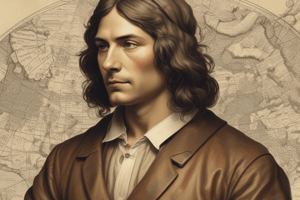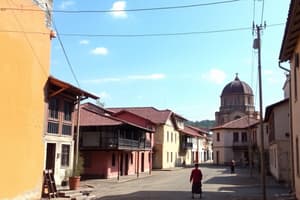Podcast
Questions and Answers
What does the Greek word 'historia' mean?
What does the Greek word 'historia' mean?
Knowledge acquired through inquiry or investigation
Which of the following are considered primary sources? (Select all that apply)
Which of the following are considered primary sources? (Select all that apply)
- History books
- Official documents (correct)
- Eyewitness accounts (correct)
- Diaries (correct)
What is the main criterion for an event to be considered a historical fact?
What is the main criterion for an event to be considered a historical fact?
A written document proving the event.
Which of these is NOT a secondary source?
Which of these is NOT a secondary source?
What does 'external criticism' focus on?
What does 'external criticism' focus on?
Name one repository of primary sources in NCR.
Name one repository of primary sources in NCR.
Dr. Henry Otley Beyer is known for his interest in which area?
Dr. Henry Otley Beyer is known for his interest in which area?
What is the process of 'hermeneutics' concerned with?
What is the process of 'hermeneutics' concerned with?
Dr. Robert B. Fox was born on May 11, ______.
Dr. Robert B. Fox was born on May 11, ______.
What are 'mentifacts'?
What are 'mentifacts'?
Flashcards are hidden until you start studying
Study Notes
History
- Derived from the Greek word "historia," meaning knowledge gained through inquiry.
- Defined by Louis Gottschalk as the study of human beliefs, desires, practices, and institutions.
- "No Document, No History" emphasizes that a historical fact must be supported by a written document.
Primary Sources
- Include eyewitness accounts, diaries, letters, legal documents, official records, and photographs.
- Vital for historical research, providing direct evidence of the past.
Repositories of Primary Sources in NCR
- The National Archives of the Philippines (Manila)
- The National Library (Manila)
- The National Historical Commission (Manila)
- The National Museum Complex (Manila)
- Private institutions: The Lopez Memorial Museum (Pasig) and Ayala Museum (Makati)
Historical Sources
- Any evidence left by humans showing previous activities.
- Original documents or items that hold significant information about past events.
Secondary Sources
- Materials that analyze and interpret primary sources.
- Examples include history books, serials, periodicals, travelogues, and speech transcripts.
Manuscripts
- Handwritten or typed records, including archival materials, memoirs, and diaries.
Non-Written Sources
- Encompass oral histories, artifacts, ruins, fossils, artworks, and audio/video recordings.
Tests of Authenticity
- Anachronistic Document Date: Dates of documents compared to rock strata using carbon dating.
- Author Identification: Analyzing handwriting to determine authorship.
- Anachronistic Style: Checking if language style is consistent with the alleged period of the document.
- Anachronistic Event Reference: Determining the historical accuracy of events mentioned in the document.
- Provenance or Custody: Assessing the genuineness and history of document ownership.
- Semantics: Analyzing the meaning of words or phrases to ensure clarity.
- Hermeneutics: Examining ambiguities in interpretation.
Internal Criticism
- Focuses on evaluating the credibility of content within the document.
Dr. Henry Otley Beyer
- Born June 13, 1833, in Edgewood, Iowa.
- First became interested in the Philippines during a visit to the 1904 St. Louis World’s Fair.
- Lived among the Ifugao people and married Lingaya Gambuk, daughter of an Ifugao chief.
Dr. Robert B. Fox
- Born May 11, 1918, in Galveston, Texas.
- Studied Anthropology, earning both Bachelor and Master of Arts degrees, focusing on the beliefs and practices of cultures.
Studying That Suits You
Use AI to generate personalized quizzes and flashcards to suit your learning preferences.




